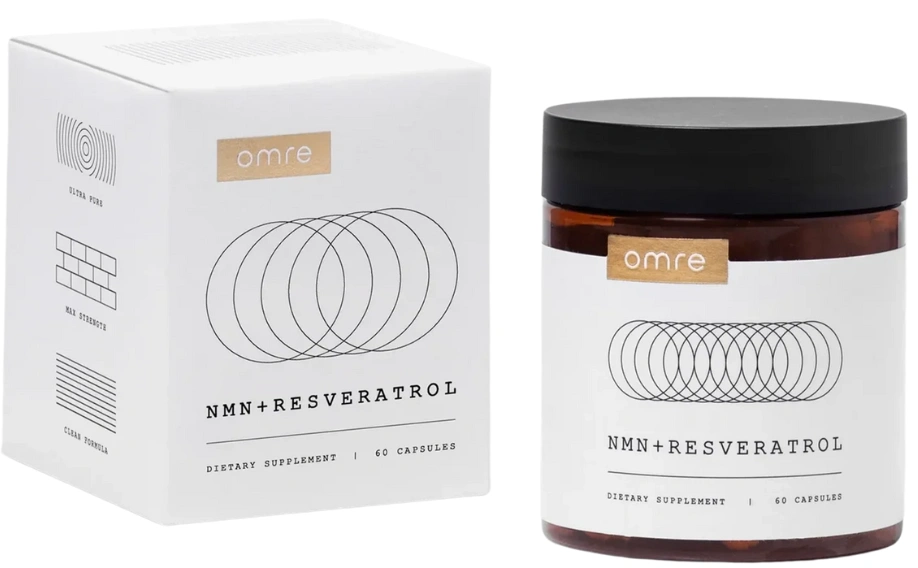Table of Contents
- How We Chose the Best Resveratrol Supplements
- Best Resveratrol Supplement of 2026: Our Top Picks
- What is Resveratrol?
- Who Can Benefit from Resveratrol Supplements?
- Key Benefits of Taking Resveratrol Supplements
- Are Resveratrol Supplements Safe?
- Food and Beverages Rich in Resveratrol
- How to Choose the Best Resveratrol Supplement for You
- Final Words
- FAQs
Resveratrol is one of the most talked-about antioxidants for supporting healthy aging, heart function, and energy at the cellular level.
This natural compound, found in fruits, nuts, wine, and other plant-based foods, has been studied for its potential to slow signs of aging by reducing inflammation, easing oxidative stress, and supporting better memory and skin health (1).
In this guide, we’ve rounded up the best resveratrol supplements of 2026, carefully selected for their purity, absorption, and ingredient quality, so you can find the one that best fits your health goals.
NMN + Resveratrol
Cellular NAD+ booster with ultra‑pure NMN and Resveratrol, at research‑backed doses.*
How We Chose the Best Resveratrol Supplements
Choosing the best resveratrol supplement means looking beyond marketing labels. Our team reviewed dozens of products and focused on measurable factors that affect purity, potency, and long-term safety.
Here’s what we looked for:
Purity above 98%: Only supplements using high-purity trans-resveratrol made from Japanese knotweed or red wine extract were included.
Enhanced absorption: Liposomal delivery, micronized resveratrol, or BioPerine to improve bioavailability.
Third-party testing: Verified safety, purity, and absence of heavy metals or fillers.
Clinical relevance: Doses and ingredient combinations supported by human or preclinical studies.
Value and transparency: Fair price per dose, clear labeling, and reputable sourcing.
We also considered verified customer feedback, certifications (like Informed-Sport or GMP), and whether each brand provided full disclosure of its formulation.
Best Resveratrol Supplement of 2026: Our Top Picks
Best Overall Resveratrol Supplement: Omre NMN + Resveratrol
Best Single-Ingredient Formula: Welzo Ultra Purity Trans-Resveratrol
Purest Trans-Resveratrol Extract: Decode Age Resveratrol Supplement
Best High-Dose Option: ProHealth Longevity Trans-Resveratrol Plus
Best for Absorption: Purovitalis Liposomal Resveratrol
Best Budget Pick: Nutricost Resveratrol 700 mg
Best for Purity and Value: Toniiq Ultra High Purity Resveratrol
Best Liposomal Capsule: Renue By Science LIPO Trans-Resveratrol
Best for Athletes and Recovery: Momentous Resveratrol
Best for Skin and Anti-Aging: Reserveage Resveratrol Beauty 500 mg
Best Whole-Food Formula: Garden of Life Raw Resveratrol
Here’s a quick side-by-side comparison of the best resveratrol supplements in 2026 to help you make the right choice.
1. Best Overall Resveratrol Supplement: Omre NMN + Resveratrol
Ingredients: 500 mg NMN, 500 mg micronized trans-resveratrol, 5 mg BioPerine
Price: Around $59.97 for a 30-day supply
Ideal for: People looking for energy, longevity, and cellular health support
At Omre, we wanted to create more than just a resveratrol supplement; we set out to build a complete cellular energy formula.
Our NMN + Resveratrol blend combines two of the most researched ingredients for healthy aging: NMN, a direct NAD+ precursor that supports energy and repair, and trans-resveratrol, a powerful polyphenol that activates sirtuins linked to longevity and cell protection.
Each serving contains clinically studied doses of both nutrients, enhanced with BioPerine for better absorption. The result is a clean, science-backed supplement that helps support focus, energy, and long-term vitality.
Whether you’re optimizing for performance or healthy aging, our formula is designed to deliver results you can feel.
Pros:
Combines NMN and resveratrol for dual cellular support
Micronized for better absorption
Doctor-formulated and third-party tested
Includes BioPerine for enhanced bioavailability
Cons:
Pricier than single-ingredient supplements
Only available through select online stores
2. Best Single-Ingredient Resveratrol: Welzo Ultra Purity Trans-Resveratrol
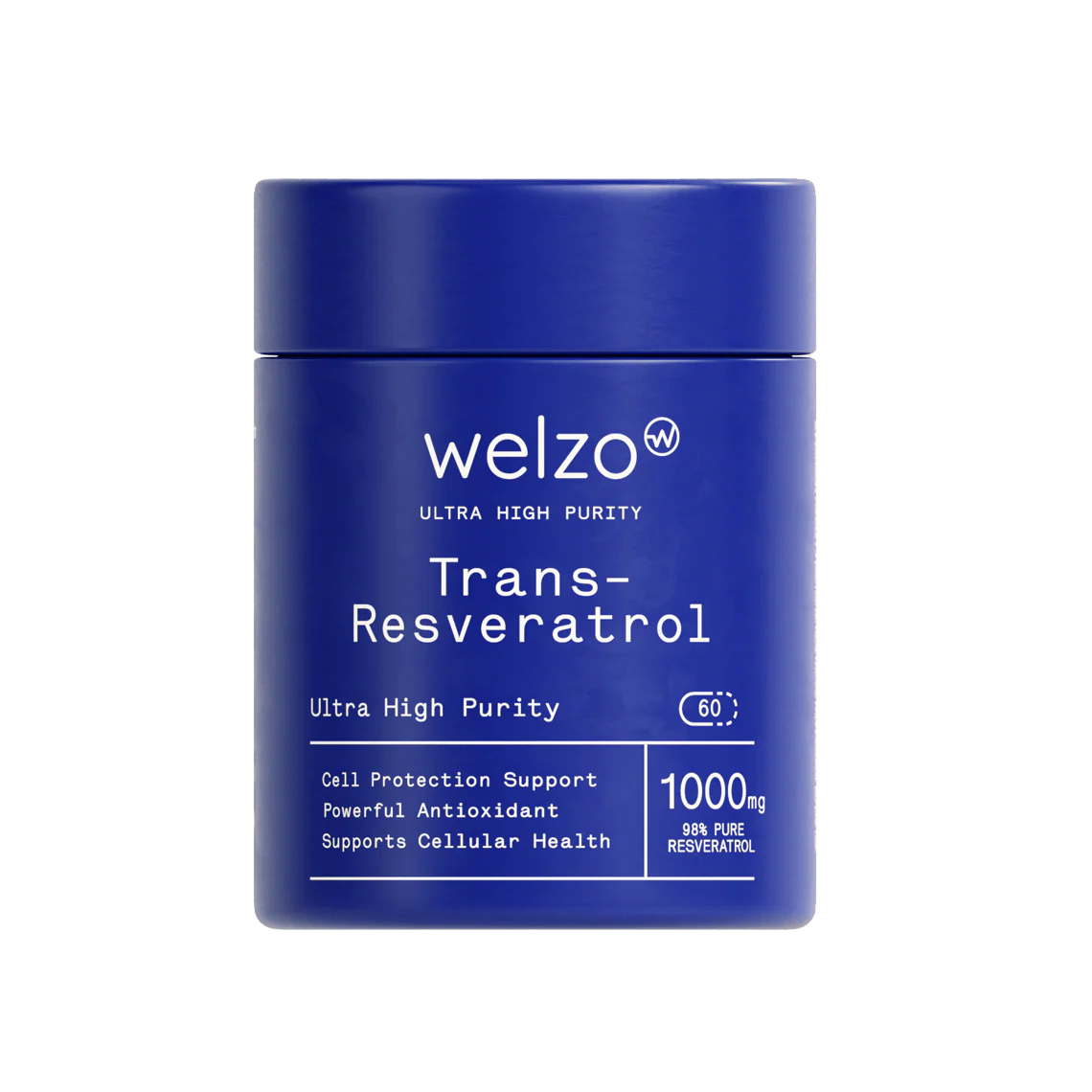 Key Details:
Key Details:
- Ingredients: 1000 mg Japanese knotweed extract (standardised to 98% trans-resveratrol)
- Price: £29.99 for a month supply
- Ideal for: Users seeking a high-dose, ultra-pure resveratrol supplement without added blends
Welzo Ultra Purity Trans-Resveratrol is a high-strength, single-ingredient formula designed for those who want maximum potency with complete formulation transparency.
Each capsule provides a full 1000 mg dose of Japanese knotweed extract, standardised to 98% trans-resveratrol — the biologically active form most commonly used in longevity and antioxidant research. The formula contains no additional polyphenols, stimulants, or fillers beyond essential excipients, making it suitable for users who prefer a clean, clinical approach to supplementation.
Pros:
- High-dose 1000 mg per capsule
- 98% standardised trans-resveratrol
- Clean, single-ingredient formulation
- Excellent value at current price point
- Suitable for advanced or long-term users
Cons:
- No added absorption enhancers
- No third-party lab testing
- High dose may be more than beginners require
Shop now
3. Purest Trans-Resveratrol Extract: Decode Age Resveratrol Supplement
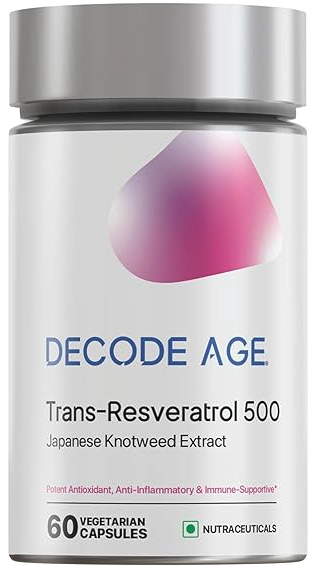 Key Details:
Key Details:
Ingredients: 99% pure trans-resveratrol (from Japanese knotweed extract)
Price: Typically around $40–$45 for a 30-day supply
Ideal for: Those prioritizing purity and clean formulations
Decode Age Resveratrol Supplement stands out for its impressive 99% purity level. Extracted from Japanese knotweed, it delivers a clean, potent source of trans-resveratrol with no unnecessary additives or binders.
The formula is designed for maximum absorption and purity, making it a good fit for people focused on quality and consistency.
This supplement supports heart and brain health while combating oxidative stress linked to aging. Decode Age’s reputation for scientific rigor and lab transparency gives this product strong credibility among longevity enthusiasts.
Pros:
Exceptionally high purity (99%)
Derived from trusted Japanese knotweed extract
Free from additives, fillers, or binders
Backed by lab testing for potency
Cons:
Not widely available outside Decode Age’s official site
Lacks absorption-enhancing ingredients
4. Best High-Dose Resveratrol: ProHealth Longevity Trans-Resveratrol Plus
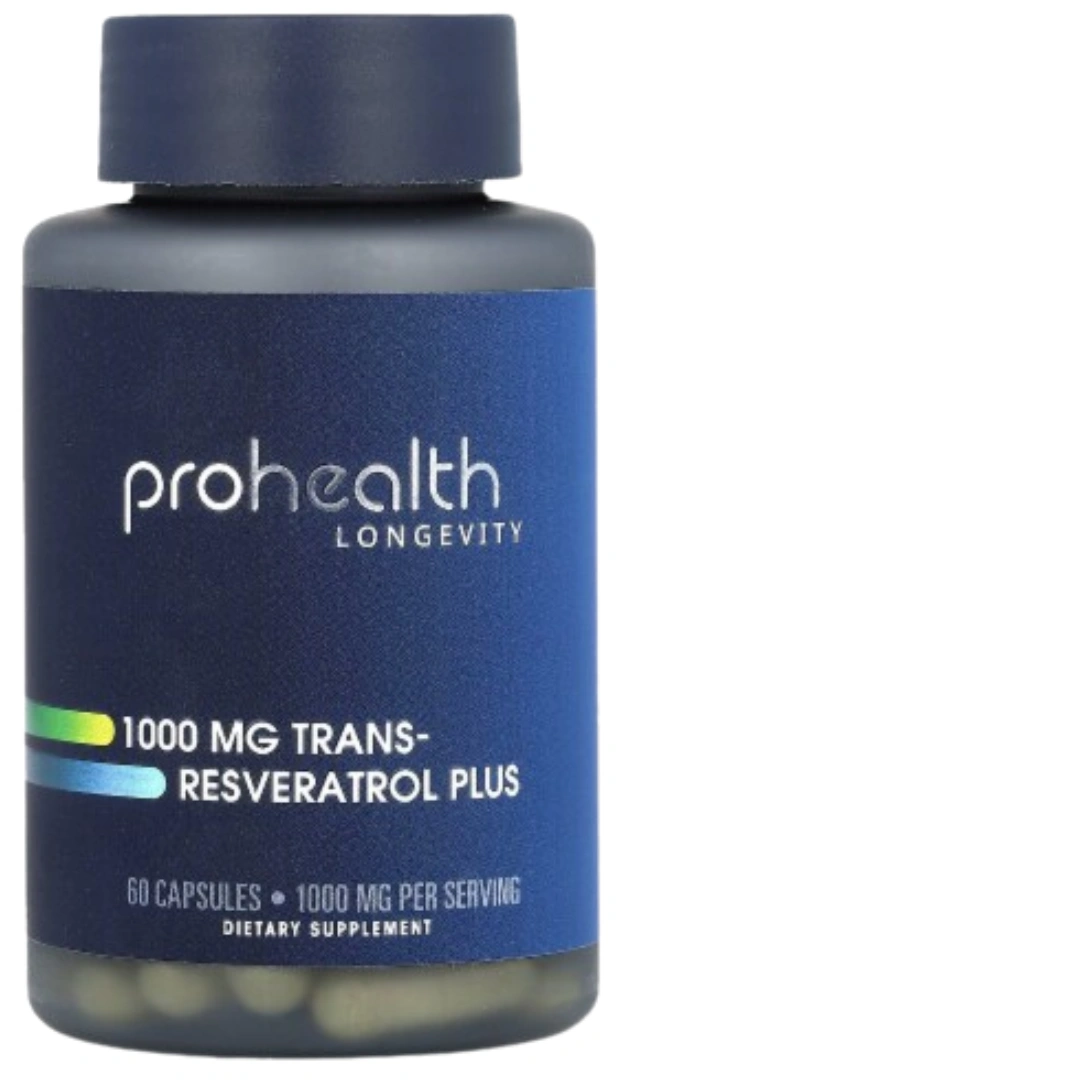 Key Details:
Key Details:
Ingredients: 1000 mg trans-resveratrol, quercetin, red wine extract, green tea extract, BioPerine
Price: Around $31.08 for 60 capsules
Ideal for: Users seeking maximum strength and antioxidant synergy
ProHealth Longevity’s Trans-Resveratrol Plus is one of the strongest on the market, offering a full gram (1000 mg) of 99.5% pure trans-resveratrol per serving.
It doesn’t stop there; it also includes antioxidant allies like quercetin, green tea extract, and BioPerine to improve absorption.
This makes it ideal for people who want a comprehensive antioxidant supplement for heart health, metabolic balance, and overall vitality.
With third-party testing and over 30 years in the supplement industry, ProHealth brings both potency and trust.
Pros:
High 1000 mg dose per serving
Includes synergistic antioxidants for added support
Contains BioPerine for better nutrient uptake
Trusted longevity brand with third-party testing
Cons:
Strong dose may not be necessary for beginners
Contains multiple active compounds (not ideal for purists)
5. Best for Absorption: Purovitalis Liposomal Resveratrol
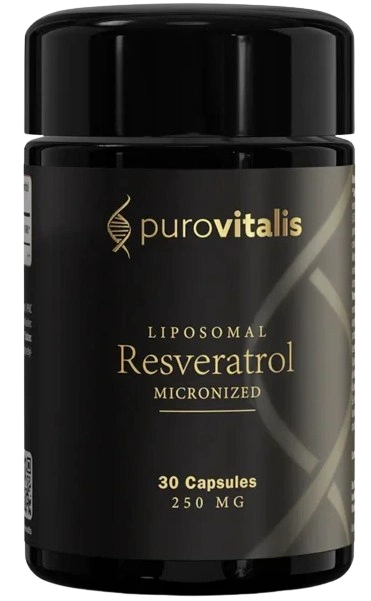 Key Details:
Key Details:
Ingredients: 250 mg trans-resveratrol (liposomal form)
Price: €26.95 (about $29–$30) for 30 capsules
Ideal for: Those who want high absorption and European-made quality
Purovitalis uses liposomal technology to make its resveratrol more bioavailable. This delivery system encases the active compound in lipid molecules that help it survive digestion and reach the bloodstream efficiently.
Each capsule delivers 250 mg of trans-resveratrol sourced from Japanese knotweed, ensuring both quality and potency.
It’s vegan, non-GMO, and manufactured in the Netherlands to strict quality standards.
While the dose may seem lower than some competitors, the liposomal form might make it significantly more effective per milligram.
Pros:
Liposomal delivery improves absorption
Clean, vegan, and non-GMO formula
Made in the EU under strict quality control
Ideal for people with sensitive digestion
Cons:
Lower milligram amount per serving
Slightly higher cost per capsule compared to standard forms
6. Best Budget Pick: Nutricost Resveratrol 700 mg
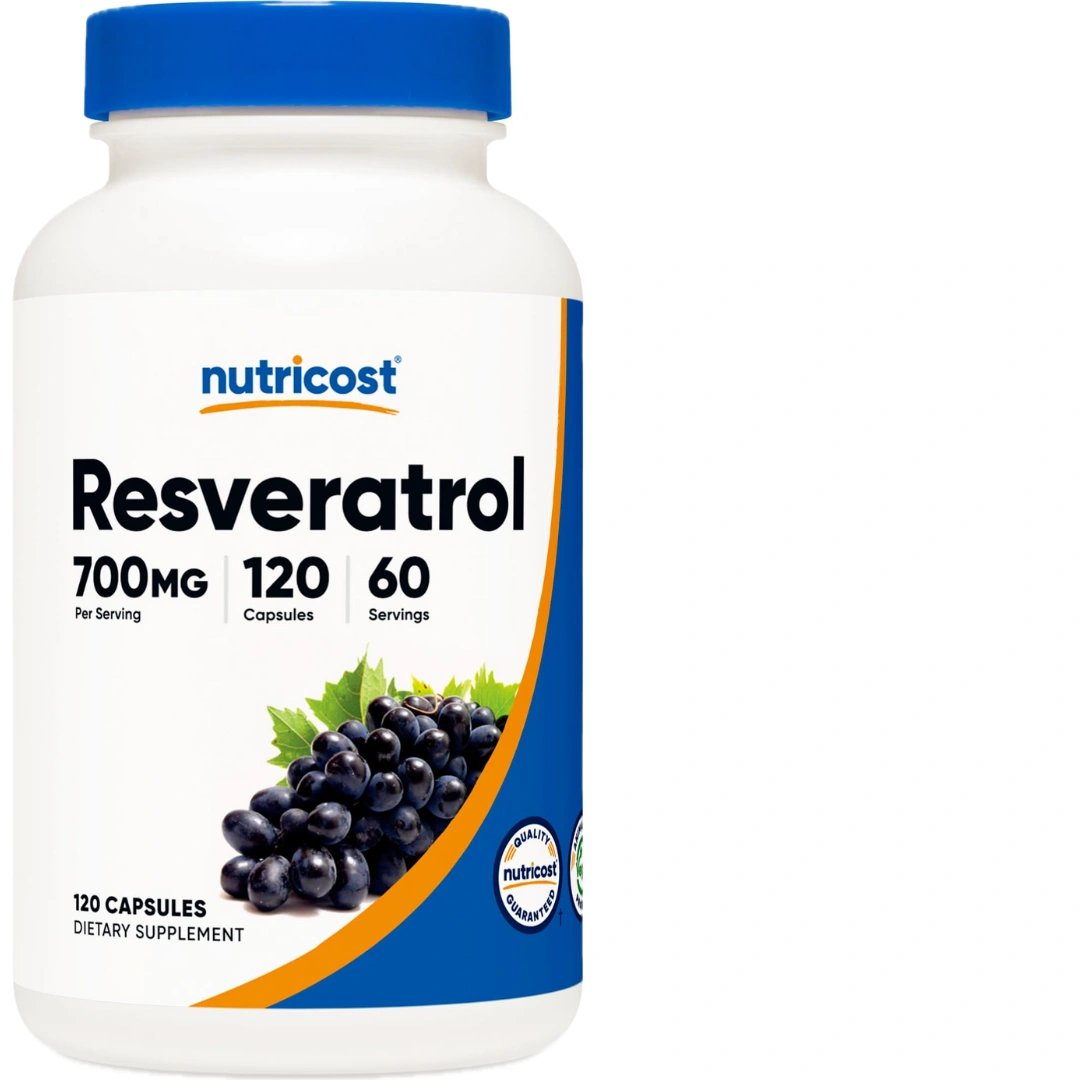 Key Details:
Key Details:
Ingredients: 700 mg resveratrol (from Japanese knotweed)
Price: Around $21.95 for 120 capsules
Ideal for: Budget-conscious users who want a simple, reliable resveratrol supplement
Nutricost Resveratrol is a straightforward formula that offers high dosage and solid quality at a fair price. Each serving delivers 700 mg of resveratrol sourced from Japanese knotweed, one of the most trusted plant sources.
It’s made in a GMP-certified facility in the USA, ensuring safety and consistency with every batch. This supplement skips unnecessary additives and fancy delivery systems, focusing instead on giving you more resveratrol for your money.
It’s a practical choice for anyone who wants long-term antioxidant support without overspending.
Pros:
Excellent price-to-dose value
Non-GMO and gluten-free
Manufactured in a GMP-certified facility
High dose for daily antioxidant support
Cons:
No added absorption enhancers
Plain capsule design, not optimized for bioavailability
7. Best for Purity and Value: Toniiq Ultra High Purity Resveratrol
-v1761942686744.webp) Key Details:
Key Details:
Ingredients: 600 mg trans-resveratrol (standardized to 98% purity)
Price: Around $38.22 for 180 capsules
Ideal for: Users who want lab-tested, filler-free purity at a good value
Toniiq Ultra High Purity Resveratrol focuses on potency and clean formulation. Each capsule contains 600 mg of resveratrol standardized to 98% purity, sourced from Japanese knotweed.
The brand is well known for its strict quality testing, ensuring every batch is free from heavy metals and contaminants.
This supplement is a favorite among health enthusiasts who value simple, no-nonsense ingredients. It offers great value for a high-purity formula, making it ideal for consistent daily use.
Pros:
98% standardized trans-resveratrol
Third-party tested for purity and safety
No fillers, preservatives, or artificial ingredients
Great long-term value
Cons:
No absorption enhancer like BioPerine
Plain formulation without additional antioxidants
8. Best Liposomal Capsule: Renue By Science LIPO Trans-Resveratrol
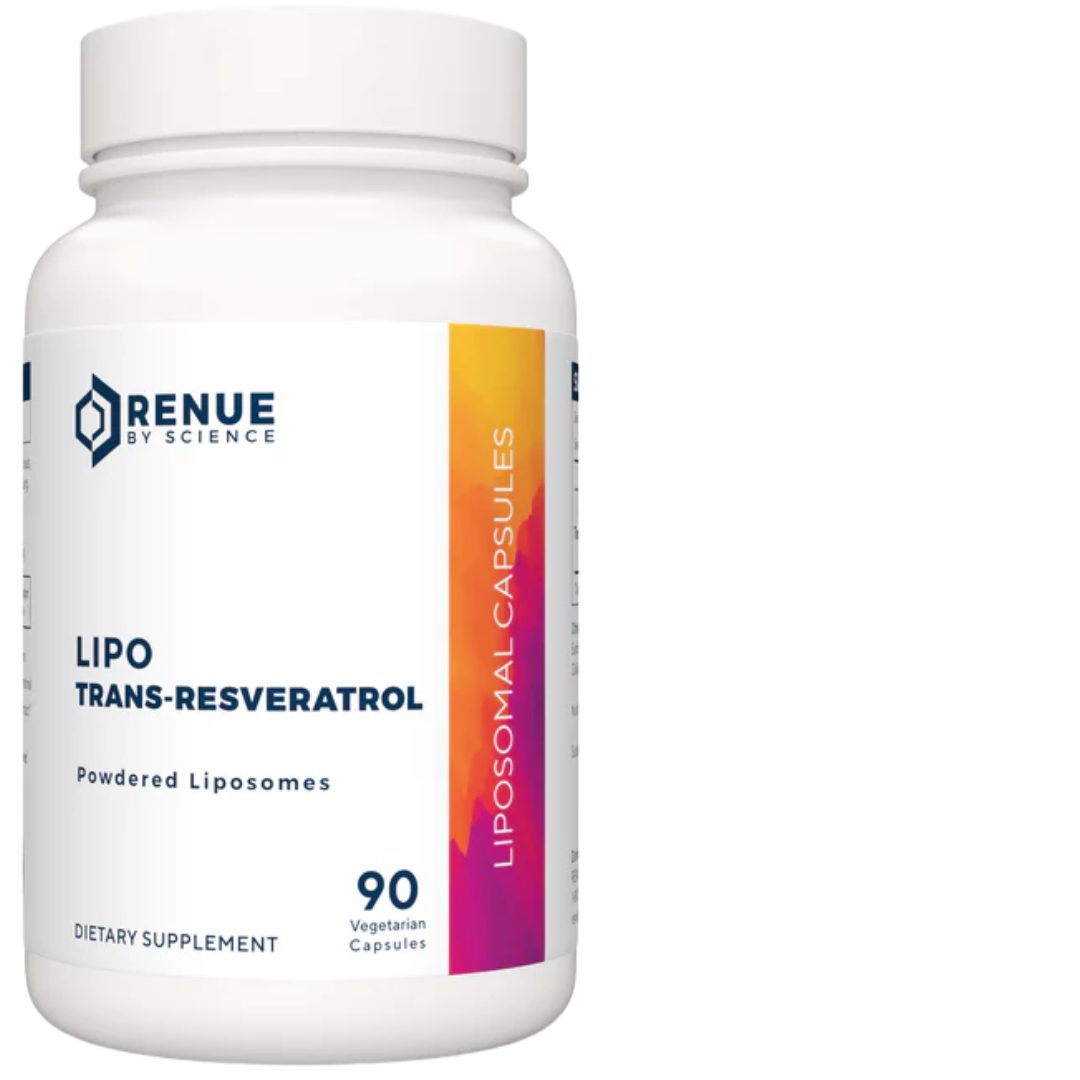 Key Details:
Key Details:
Ingredients: 125 mg trans-resveratrol (liposomal form)
Price: Around $49.95 for 60 capsules
Ideal for: Those seeking a bioavailable, scientifically advanced formula
Renue By Science is known for its cutting-edge delivery technology, and their LIPO Trans-Resveratrol is a great example.
Each capsule contains 125 mg of liposomal resveratrol, designed to improve absorption and ensure more of the active compound reaches your cells.
Although the dosage per capsule is modest, the liposomal form is often far more effective than higher-dose traditional powders.
This makes it a smart choice for users who prioritize efficiency, purity, and scientifically backed delivery systems.
Pros:
Liposomal technology enhances bioavailability
Manufactured under pharmaceutical-grade standards
Vegan, non-GMO, and filler-free
Gentle on digestion
Cons:
Higher cost per milligram
Smaller serving size than standard capsules
9. Best for Athletes and Recovery: Momentous Resveratrol
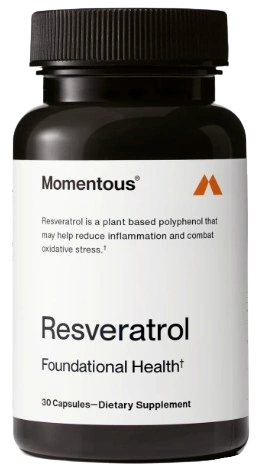 Key Details:
Key Details:
Ingredients: 450 mg trans-resveratrol (from Japanese knotweed)
Price: Around $48 for 60 capsules
Ideal for: Athletes and active individuals focused on recovery and cardiovascular performance
Momentous Resveratrol is designed with performance in mind. It’s Informed-Sport certified, meaning every batch is tested for banned substances, a must for professional athletes.
The 450 mg of trans-resveratrol helps combat oxidative stress from intense workouts, supporting muscle recovery and endurance.
With its clean formulation and third-party testing, Momentous is ideal for people who want the benefits of resveratrol without worrying about product purity or safety.
The certification and brand reputation make it a top pick for the athletic community.
Pros:
Certified by Informed-Sport for safety
Great for athletic recovery and endurance
Clean, vegan-friendly formula
Reputable brand used by professionals
Cons:
Higher price compared to basic resveratrol capsules
Limited availability outside North America
10. Best for Skin and Anti-Aging: Reserveage Resveratrol Beauty 500 mg
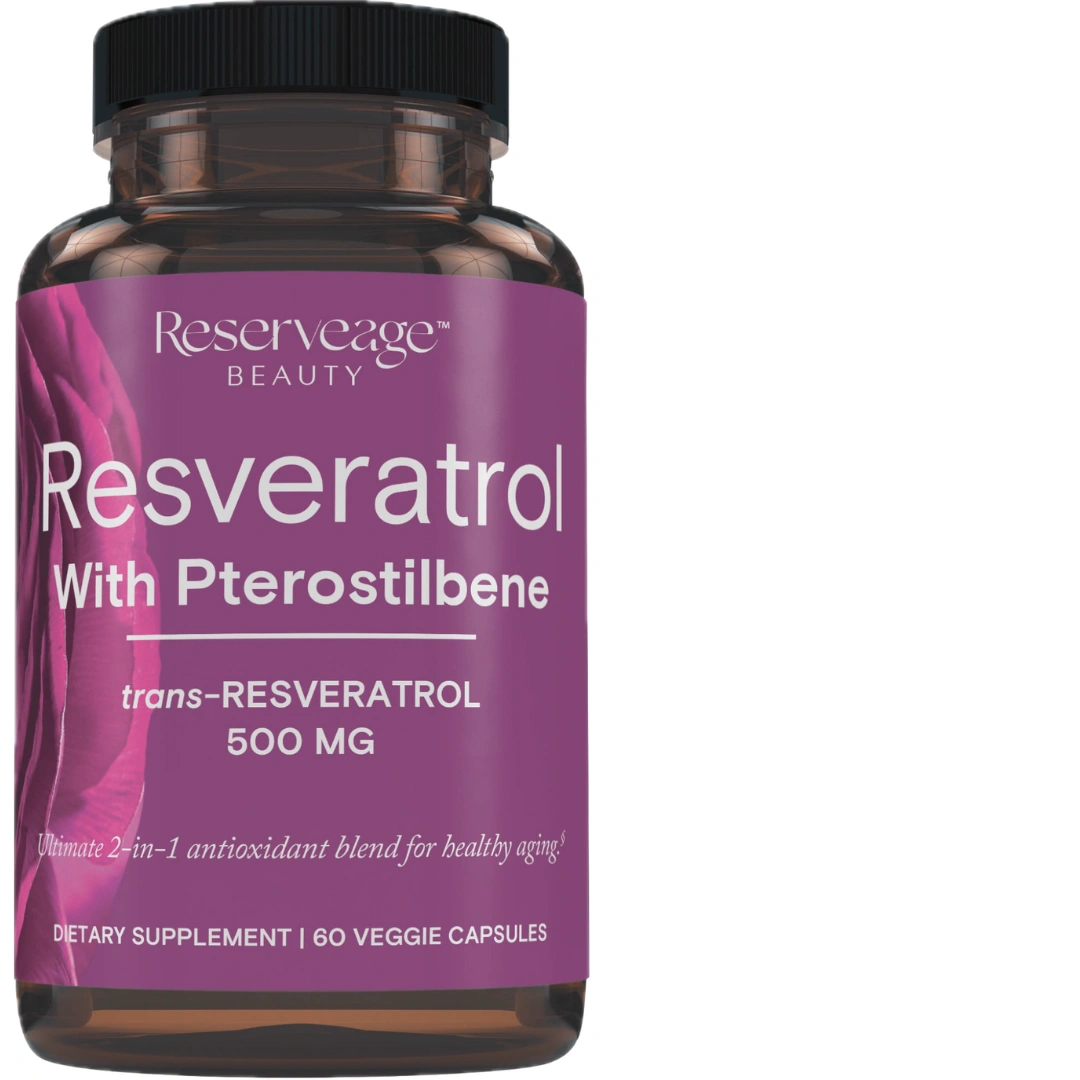 Key Details:
Key Details:
Ingredients: 500 mg trans-resveratrol (from Japanese knotweed and red wine grapes), quercetin, and grape seed extract
Price: Around $37.83 for 30 capsules
Ideal for: Users focused on beauty, skin health, and cellular protection
Reserveage Resveratrol Beauty combines trans-resveratrol with quercetin and grape seed extract under its signature “Pro-Longevity Factors®” blend.
Together, these antioxidants help combat oxidative stress that contributes to aging and skin dullness.
It’s one of the few formulas that target both inner health and outward appearance, making it perfect for users who want anti-aging benefits alongside traditional heart and brain support.
The ingredients are naturally sourced, and the product is non-GMO and gluten-free.
Pros:
Focuses on both skin and longevity benefits
Contains synergistic antioxidants like quercetin
Non-GMO and gluten-free
Trusted, beauty-oriented brand
Cons:
Smaller bottle size for the price
Not ideal for those wanting a single-ingredient formula
11. Best Whole-Food Formula: Garden of Life Raw Resveratrol
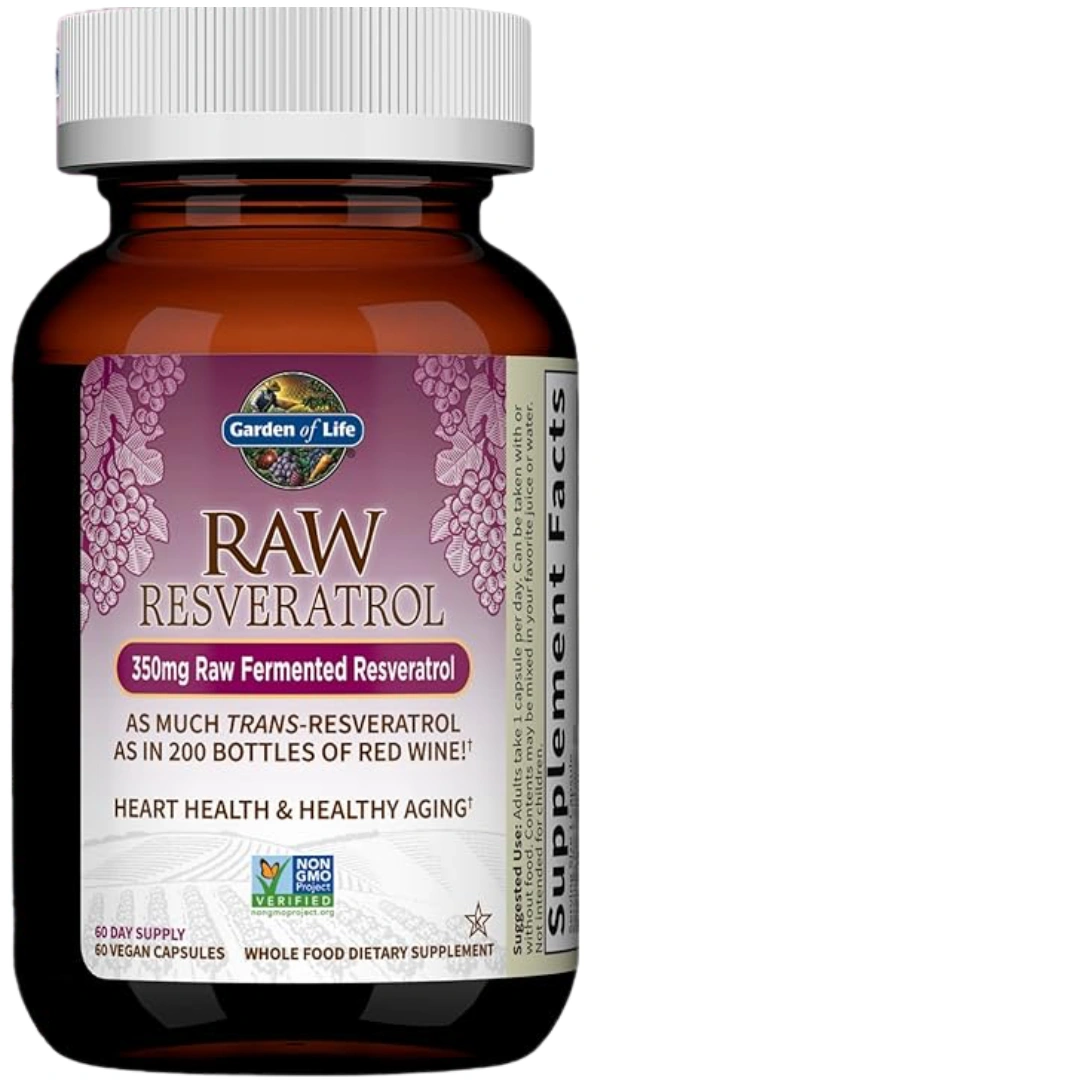 Key Details:
Key Details:
Ingredients: 350 mg raw fermented trans-resveratrol, fruit and vegetable blend, 500 million CFU probiotics
Price: Around $39.54 for 60 capsules
Ideal for: People who prefer a natural, plant-based, whole-food supplement
Garden of Life Raw Resveratrol blends trans-resveratrol from Japanese knotweed with organic fruit and vegetable extracts.
What makes it unique is the inclusion of live probiotics and enzymes that support gut health while improving nutrient absorption.
This whole-food approach makes it perfect for those who value clean, organic nutrition. The fermented resveratrol is gentle on the digestive system and supports healthy aging, heart health, and immune balance in a natural way.
Pros:
Includes probiotics and digestive enzymes
Certified organic, vegan, and non-GMO
Whole-food, fermented formula
Supports both heart and gut health
Cons:
Mild flavor and aroma due to fermentation
Slightly higher price compared to basic formulas
NMN + Resveratrol
Cellular NAD+ booster with ultra‑pure NMN and Resveratrol, at research‑backed doses.*
What is Resveratrol?
 Resveratrol is a natural compound found in red grapes, dark chocolate, and Japanese knotweed that supports heart health, brain function, and healthy aging.
Resveratrol is a natural compound found in red grapes, dark chocolate, and Japanese knotweed that supports heart health, brain function, and healthy aging.
It’s made up of resveratrol molecules, which act as powerful antioxidants and anti-inflammatory agents that protect cells from damage caused by daily stress and a poor diet.
This compound works by activating sirtuins, the proteins responsible for cellular repair, balance, and energy regulation. However, oral resveratrol in its natural state has low bioavailability, meaning the body absorbs only a small portion of it.
That’s why most supplements use the trans form of resveratrol, which is considered the most active and effective type for improving absorption.
To make resveratrol treatment more effective, modern formulas include active components such as BioPerine or liposomal delivery systems that enhance uptake.
Supplements are also available in different doses, allowing users to choose based on their individual health goals and tolerance.
Who Can Benefit from Resveratrol Supplements?
Resveratrol supplementation can be helpful for anyone who wants to support long-term health, energy, and graceful aging. Since resveratrol works at the cellular level to reduce oxidative stress and inflammation, it benefits a wide range of people, especially those with busy lifestyles or age-related concerns.
Here are a few groups who may benefit most:
Adults over 35: Natural resveratrol levels in the body decline with age, making supplementation useful for supporting longevity and heart health.
People with cardiovascular concerns: Resveratrol may help improve circulation and support healthy cholesterol levels.
Those managing blood sugar: Studies show resveratrol can improve insulin sensitivity and metabolic function.
Active individuals and athletes: Its anti-inflammatory properties help with recovery and muscle repair.
Anyone under chronic stress: Antioxidants like resveratrol protect against the cellular damage linked to daily stress and poor sleep.
Key Benefits of Taking Resveratrol Supplements
Resveratrol has been widely studied for its impressive health benefits, especially in supporting heart and brain health and promoting overall longevity. It influences several pathways in the body that protect against oxidative stress, improve cell survival, and slow the aging process.
Disclaimer: The following benefits are based on current research. Individual results may vary, and resveratrol should not replace professional medical advice or prescribed treatment.
Here are some of the most recognized beneficial effects seen in studies:
Heart Health and Circulation: Studies suggest resveratrol supports cardiovascular health by reducing inflammation, promoting better blood flow, and helping regulate blood clotting (2). It may also lower LDL cholesterol and protect against heart disease and other forms of cardiovascular disease (2).
Brain and Cognitive Function: Research shows resveratrol’s antioxidant action may protect brain cells from damage, supporting cognitive performance and mental clarity (3). Some studies also point to potential protection against Alzheimer’s disease and age-related decline in cognitive function (4).
Blood Sugar and Metabolism: Resveratrol may help improve insulin sensitivity and stabilize blood sugar levels, especially in people with metabolic issues (5). Supporting better glucose control helps maintain steady energy levels throughout the day.
Joint and Inflammatory Support: Its anti-inflammatory properties can help reduce joint discomfort and stiffness, making movement easier for those with arthritis or chronic inflammation (6).
- Longevity and Cellular Protection: In animal research, resveratrol mimics caloric restriction, a well-known trigger for lifespan extension (7). It supports cell survival, DNA repair, and mitochondrial health, all of which may help the body extend lifespan and age more gracefully.
Are Resveratrol Supplements Safe?
Resveratrol supplements are generally considered safe when taken within recommended doses, usually between 250 mg and 1000 mg per day. Most research reports mild or no side effects in healthy adults.
However, as with any supplement, it’s best to start slowly and observe how your body responds. Some people may experience mild, temporary effects such as:
Digestive upset or bloating
Headache or fatigue (if taken on an empty stomach)
Mild dizziness in higher doses
If you are on blood-thinning medication (like warfarin or aspirin), have low blood pressure, or are pregnant or breastfeeding, consult your healthcare provider before taking resveratrol.
When used properly, resveratrol is well-tolerated and may even enhance the benefits of a balanced diet and regular exercise. Many people safely take it long-term as part of a daily longevity or heart health routine.
Food and Beverages Rich in Resveratrol
You don’t have to rely only on supplements to get resveratrol. It’s naturally present in a variety of plant-based foods and drinks known for their antioxidant and heart-supporting properties.
Here are some of the best natural sources:
Red grapes: Especially the skin, which is rich in raw fermented resveratrol, the same form often used in quality supplements.
Red wine: A moderate amount may support heart health thanks to its polyphenols, including resveratrol molecules derived from grape fermentation.
Peanuts: A simple and nutritious snack that contains trace amounts of resveratrol.
Dark chocolate and cocoa: Offer beneficial flavonoids and a small boost of natural resveratrol.
Blueberries and cranberries: Packed with antioxidants and plant compounds that support healthy aging.
Japanese knotweed: The main source of raw fermented Japanese knotweed extract, used to produce most supplement-grade resveratrol.
While these foods provide natural resveratrol, you’d need to consume large amounts daily to match the amount found in one capsule of a concentrated supplement. That’s why many people choose resveratrol supplements for more consistent and measurable benefits.
How to Choose the Best Resveratrol Supplement for You
-v1761946318567.webp) Finding the right resveratrol supplement depends on your goals, budget, and how well your body absorbs it. Look for products that combine purity, transparency, and proven bioavailability.
Finding the right resveratrol supplement depends on your goals, budget, and how well your body absorbs it. Look for products that combine purity, transparency, and proven bioavailability.
Choose Trans-Resveratrol, Not Cis-Resveratrol
Trans-resveratrol is the active form your body recognizes and uses efficiently. Supplements that specify “trans-resveratrol” on the label offer better antioxidant and anti-aging potential than those using mixed or unspecified forms.
Check for Purity and Third-Party Testing
Aim for supplements with at least 98–99% purity and certifications from independent labs. This ensures you’re getting genuine, uncontaminated resveratrol free from heavy metals or additives.
Look for Enhanced Absorption
Resveratrol can be difficult to absorb in the gut. Look for formulas that include BioPerine (black pepper extract), micronized particles, or liposomal delivery systems. These methods improve bioavailability and make each dose more effective.
Choose the Right Dosage for Your Needs
For general wellness, 250–500 mg per day is enough. If you’re aiming for more targeted effects like cardiovascular or longevity support, doses up to 1000 mg are often used in studies. Always start low and increase gradually.
Consider Additional Supportive Ingredients
Some supplements combine resveratrol with NMN, quercetin, or green tea extract to enhance results. These compounds work synergistically, supporting metabolism, energy, and antioxidant defense.
Read more: Fisetin vs Quercetin: Which One is Right for You?
Final Words
Resveratrol continues to be one of the most fascinating supplements for promoting heart health, longevity, and energy production. From pure single-ingredient capsules to advanced liposomal blends, there’s something for every goal and budget.
The key is choosing a supplement that’s high in trans-resveratrol, clinically dosed, and third-party tested so you know you’re getting the real thing.
If you’re looking for a resveratrol supplement that does more than just provide antioxidants, Omre NMN + Resveratrol is the clear choice.
With equal parts NMN and resveratrol, plus BioPerine for better absorption, it supports your body’s natural energy, cellular repair, and long-term vitality, all in one daily capsule.
Shop Omre NMN + Resveratrol now and experience what smarter longevity feels like.
FAQs
What’s the best time to take resveratrol?
Most experts suggest taking resveratrol in the morning with food that contains healthy fats to help absorption. If you’re pairing it with NMN, both can be taken together at the same time for cellular energy support.
Is resveratrol safe to take daily?
Yes, resveratrol is generally well tolerated in doses of 250–1000 mg per day. However, people taking blood thinners or other medications should consult a healthcare provider before starting any supplement.
Can I take resveratrol with NMN or NAD+ boosters?
Yes. In fact, many longevity researchers recommend combining them since resveratrol helps activate sirtuins while NMN supports NAD+ production, both key for cellular repair and healthy aging.
How long does resveratrol take to work?
Most people start noticing subtle benefits in energy, skin tone, or focus within 4 to 8 weeks of consistent use. Deeper effects, like improved cardiovascular function, may take a few months of daily supplementation.






